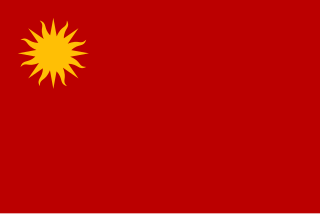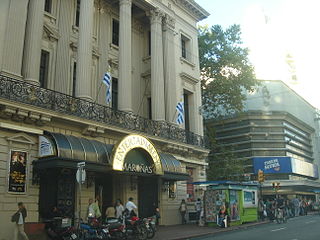Carlos Gardel was a French-born Argentine singer, songwriter, composer and actor, and the most prominent figure in the history of tango. He was one of the most influential interpreters of world popular music in the first half of the 20th century. Gardel is the most famous popular tango singer of all time and is recognized throughout the world. He was notable for his baritone voice and the dramatic phrasing of his lyrics. Together with lyricist and long-time collaborator Alfredo Le Pera, Gardel wrote several classic tangos.

The Colorado Party is a liberal political party in Uruguay.

Luis Alberto Lacalle de Herrera, GCMG, is a Uruguayan politician and lawyer who served as President of Uruguay from 1990 to 1995.

Juan María Bordaberry Arocena was a Uruguayan politician and cattle rancher, who served as constitutional President from 1972 until 1973, and then ruled as the head of a civilian-military dictatorship up to 1976.

Jorge Pacheco Areco was a Uruguayan politician and member of the Colorado Party. He served as President of Uruguay from December 6, 1967 to March 1, 1972.

Uruguayan literature has a long and eventful history.
Latin American literature consists of the oral and written literature of Latin America in several languages, particularly in Spanish, Portuguese, and the indigenous languages of the Americas. It rose to particular prominence globally during the second half of the 20th century, largely due to the international success of the style known as magical realism. As such, the region's literature is often associated solely with this style, with the 20th century literary movement known as Latin American Boom, and with its most famous exponent, Gabriel García Márquez. Latin American literature has a rich and complex tradition of literary production that dates back many centuries.
Jorge Sanguinetti was a Uruguayan political figure.

The 13th Pan American Games were held in Winnipeg, Manitoba, Canada from July 23 to August 8, 1999.

Rodolfo Macías Fattoruso is a literary critic and editor. He has worked as a literary critic since 1976.
"The Congress" is a 1971 short story by Argentine writer Jorge Luis Borges. The story is on an utopic universal congress and is seen by critics as a political essay.
The 1999 South American Youth Championship is a football competition contested by all ten U-20 national football teams of CONMEBOL. The tournament was held in Argentina between January 5 and January 25, 1999, the 23rd time the competition had been held and the 2nd to take place in the country. Argentina finished undefeated, winning their 3rd trophy.
Basque Uruguayans are citizens of Uruguay who are of Basque ancestry.

The history of the Jews in Uruguay dates back to the colonial empire. Perhaps the most important influx of Jewish population was during the 20th century, due to World War I and World War II. Uruguay's Jewish community is mainly composed of Ashkenazi. Uruguay is home to the fifth largest Jewish community in Latin America after Argentina, Brazil, Mexico, and Chile respectively, and the largest as a proportion of the total population.

A Uruguayan Argentine is an Argentine citizen of Uruguayan descent or a Uruguay-born person who resides in Argentina. As of 2012, there were over 116,000 Uruguayans living in Argentine territory.

El Día is an influential Uruguayan daily newspaper.